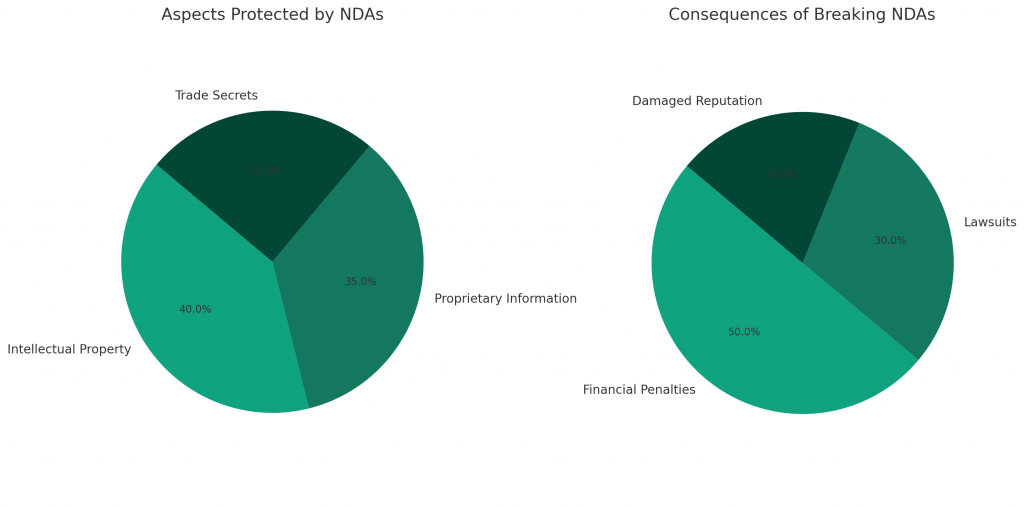Upholding Business Confidentiality: The Role of NDAs in Remote Work
In a world that’s rapidly shifting toward remote work, protecting your business secrets has never been more crucial. Non-disclosure agreements (NDAs) are an important legal tool to do just that.
This article will help you understand NDAs and their paramount importance in a virtual work environment. So, read on and let us secure your business together!
Key Takeaways
- Non – Disclosure Agreements (NDAs) are crucial in remote work to protect intellectual property, proprietary information, and trade secrets.
- NDAs facilitate new partnerships and expansion into different locations by ensuring confidentiality and preventing theft or misuse of sensitive information.
- Choosing appropriate communication tools and methods is important for effective enforcement of NDAs in remote work situations.
- Breaking an NDA can result in financial penalties, lawsuits, damaged trust and reputation, highlighting the need for upholding confidentiality agreements.
Understanding Non-Disclosure Agreements (NDAs)
Non-Disclosure Agreements (NDAs) are legal documents that outline the terms and conditions of maintaining confidentiality for sensitive information between parties involved in a business transaction or partnership.
Definition and Key Elements
A Non-Disclosure Agreement, often referred to as an NDA, is a legally binding document designed to safeguard sensitive business information. Two main components make up this agreement – the definition of what’s confidential and the obligation parties have to protect that information.
The agreement specifically details which information cannot be shared outside of those involved in the agreement, such as proprietary data, trade secrets or new product plans. Additionally, it clarifies how recipients of this information must handle and protect these valuable insights from being misused or leaked out.
Penalties for breaching this contract can include hefty fines or legal repercussions depending on what was outlined in the original contract.
Types of NDAs
Understanding the different types of Non-Disclosure Agreements (NDAs) helps to protect sensitive information and prevent intellectual property theft. The first type is a Unilateral Agreement, often used in scenarios where only one party discloses confidential information. A common example is when a start-up company pitches its business idea to potential investors.
The Importance of NDAs in Remote Work
Protecting Intellectual Property, Safeguarding Proprietary Information and Trade Secrets, and Facilitating New Partnerships and Expansion Locations are key reasons why NDAs are important in remote work.
Protecting Intellectual Property
Businesses thrive on the uniqueness of their ideas, which form their intellectual property. This precious asset is often targeted by competitors seeking an unfair advantage. With workplace dynamics shifting towards remote work, protecting this intellectual property becomes even more crucial.
Non-Disclosure Agreements (NDAs) play a pivotal role in this regard – they act as legal shields for sensitive information, preventing its misuse or theft. Intellectual Property comprises various valuable assets such as proprietary data, trade secrets and innovations that give businesses their competitive edge.
NDAs work by legally binding employees to confidentiality – any breach can lead to significant financial penalties and damage to business reputation proving detrimental for the offender’s career path.
Thus, NDAs reinforce trust within remote teams and deter potential infringements on a company’s intellectual property rights.
Safeguarding Proprietary Information and Trade Secrets
Non-disclosure agreements play a critical role in securing proprietary information and trade secrets. With the current rise of remote work, protecting vital data has become more important than ever before.
Companies often share their confidential details with stakeholders such as suppliers, potential investors, advisors, or even clients to drive growth and business opportunities. In this process, strategies like secret recipes, manufacturing techniques or processes, non-public accounting figures can be exposed which constitute the firm’s trade secrets.
Entering into an NDA safeguards these business-specific software workings and helps avoid unnecessary network vulnerabilities caused by mishandling sensitive intel. It ensures that recipients respect privacy norms and maintain the needed secrecy indefinitely in some cases as specified in the agreement; a breach invites legal repercussions including financial penalties and injunctions under relevant jurisdiction laws framed within NDAs for remote work scenarios.
Hence an investment is made towards crafting effective Non-use and Non-compete clauses supplemented with sound attorney provision fee clauses to offer comprehensive protection against misappropriation of businesses’ valuable assets – proprietary formulas included.
Facilitating New Partnerships and Expansion Locations
NDAs play a crucial role in facilitating new partnerships and expansion locations for businesses. When entering into negotiations or collaborations with potential partners, companies can use NDAs to protect their sensitive information and trade secrets.
This helps build trust between parties and creates a secure environment for discussing business opportunities. By ensuring confidentiality, NDAs enable organizations to confidently share proprietary data, innovative ideas, and strategic plans with potential partners without the fear of theft or misuse.
Furthermore, as businesses consider expanding into new markets or setting up operations in different locations, NDAs become essential in safeguarding their confidential information.
Whether it’s sharing proprietary formulas, manufacturing processes, client contact lists, or non-public accounting figures during due diligence processes with investors or creditors, an NDA ensures that the shared information remains confidential and limits the risk of competitors gaining access to valuable business insights.
In this way, NDAs not only protect a company’s existing assets but also pave the way for exploring new business opportunities while maintaining privacy and security.
Key Considerations for NDAs in Remote Work
Choosing appropriate communication tools and methods is crucial for ensuring the effective enforcement of NDAs across global locations.
Communication Tools and Methods
Effective communication platforms are crucial for the effectiveness of NDAs in remote work. Here are some communication tools and methods that can facilitate secure and confidential communication:
- Encrypted messaging apps like Signal and Telegram provide enhanced privacy and security for NDA communication in remote work.
- Video conferencing platforms such as Zoom and Microsoft Teams enable virtual meetings and discussions while maintaining confidentiality.
- Virtual data rooms offer a secure environment for storing and sharing confidential documents related to NDAs in remote work.
- Cloud-based collaboration tools like Google Drive and Dropbox allow seamless sharing and editing of NDA-related files among remote team members.
- Virtual private networks (VPNs) ensure secure and encrypted communication channels, protecting the confidentiality of NDAs in remote work situations.
Enforcing NDAs Across Global Locations
Enforcing NDAs across global locations is vital in remote work situations to protect confidential information and prevent the theft of intellectual property. Global expansion and the involvement of international markets require businesses to establish enforceable NDAs that transcend jurisdictional boundaries.
By ensuring that all parties involved understand and abide by the terms of the NDA, companies can safeguard their proprietary data and trade secrets. This includes implementing communication applications with robust security features, using translation tools for effective collaboration, and utilizing video conferencing technologies for secure discussions.
Additionally, including clauses such as non-use, non-compete, representative provision, duration, return, arbitration and attorney provision fee in NDAs strengthens legal protection worldwide.
Potential Consequences of Breaking an NDA
Breaking an NDA can have serious consequences. Firstly, it can result in financial penalties and lost profits for the business that entrusted confidential information. Secondly, it may lead to a lawsuit from the employer, resulting in legal costs and potential damages.
Additionally, breaching an NDA can damage trust and reputation, making it difficult to establish future business partnerships. It’s important to remember that public records such as SEC filings are not covered by NDAs, so disclosing this information could have legal implications without any protection.
Overall, breaking an NDA can have significant repercussions both financially and legally, highlighting the importance of upholding confidentiality agreements.
Crafting an Effective NDA for Remote Work
Crafting an Effective NDA for Remote Work is crucial in protecting your company’s intellectual property and trade secrets. Learn about the key clauses to include and the considerations to keep in mind to ensure a legally-binding document that safeguards your business in today’s remote work environment.
Non-Use and Non-Compete Clauses
Non-use and non-compete clauses are essential components of NDAs for remote work. The non-use clause prohibits the recipient from using confidential information in any way that could harm the disclosing party’s business interests.
This ensures that sensitive data remains protected and prevents misuse or unauthorized sharing. On the other hand, the non-compete clause restricts the recipient from engaging in similar business activities or working with competitors.
These clauses help safeguard trade secrets, prevent conflicts of interest, and maintain trust between parties involved in remote work agreements.
Duration and Return Clauses
Duration clauses in an NDA specify the length of time that the agreement will be in effect. This can range from just a few years to indefinitely, depending on the needs and preferences of the parties involved.
By including a duration clause, both parties are clear on how long they are obligated to keep information confidential. Return clauses, on the other hand, outline the obligations regarding returning or destroying confidential information once the NDA expires or is terminated.
These clauses ensure that any sensitive data remains protected even after the agreement comes to an end.
Arbitration and Attorney Provision Fee Clauses
Arbitration and attorney provision fee clauses are important elements to consider when crafting an effective non-disclosure agreement (NDA) for remote work. An arbitration clause allows for dispute resolution outside of the court system, providing a more efficient and cost-effective process for resolving conflicts related to the NDA.
This can save both parties time and money by avoiding lengthy court proceedings. On the other hand, attorney provision fee clauses specify that in case of a lawsuit arising from the NDA, the losing party would be responsible for paying the legal fees of the prevailing party.
This serves as a deterrent against frivolous lawsuits and encourages parties to carefully consider their actions before taking legal action. These clauses help ensure fairness and provide protection for both parties involved in remote work agreements.
When to Request Signatures and Involve a Lawyer
Requesting signatures and involving a lawyer in the process of signing non-disclosure agreements (NDAs) is crucial to ensure legal protection and accountability. Here are some key points to consider:
- Before sharing confidential information: Request signatures on an NDA before disclosing any sensitive information to safeguard intellectual property and prevent unauthorized use or disclosure.
- When entering into business partnerships: Involve a lawyer when establishing new partnerships or collaborations to ensure that the NDA adequately protects your interests and aligns with your business goals.
- When dealing with high-value clients or suppliers: Involving a lawyer can help negotiate and draft specific clauses tailored to protect your business’s trade secrets, proprietary data, or other confidential information when dealing with VIP clients or suppliers.
- For complex business transactions: Engage a lawyer when involved in mergers, corporate takeovers, or other significant business dealings where the stakes are high and strict confidentiality is essential.
- When drafting customized NDAs: A lawyer’s expertise is valuable in crafting non-disclosure agreements that address unique circumstances, specific industry regulations, or international enforceability requirements.
- If there is potential for legal disputes: Requesting signatures on an NDA and involving a lawyer early on can help establish legal recourse options should a breach of the agreement occur, minimizing potential financial penalties and legal costs.

Conclusion
NDAs play a crucial role in remote work, especially when it comes to protecting intellectual property, safeguarding proprietary information and trade secrets, and facilitating new partnerships and expansion locations.
These legal documents ensure that sensitive information remains confidential and prevent potential breaches that could lead to financial penalties or lawsuits. By prioritizing NDAs in remote work arrangements, businesses can maintain trust, secure their valuable assets, and navigate the global marketplace with confidence.

